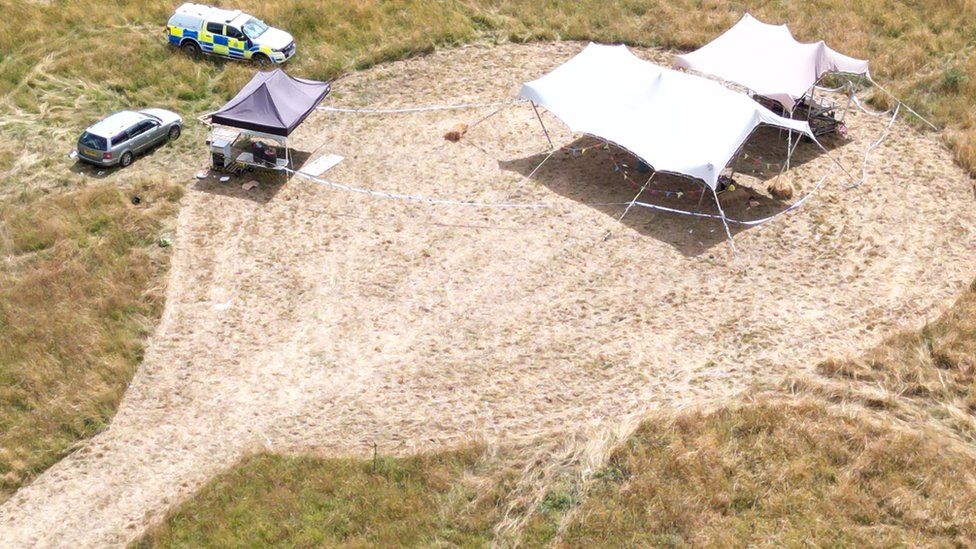2022 was the warmest year on record in the UK, the Met Office has confirmed, with experts warning the unprecedented heat is a sign of things to come.
It was also the first year in which a temperature above 40C (104F) was recorded in the UK. A record-breaking 40.3C was recorded on 19 July at Coningsby, Lincolnshire.
Prof Liz Bentley, the chief executive of the Royal Meteorological Society, who oversees the journal that published the annual report, said: “I’ve never seen 40C in the UK before … to break that record I think was a real milestone.
“This was probably the first time we saw a hot, dry summer for a while. If you look at future climate projections, we are on a path [towards] hotter, drier summers. So 2022 was very much a sign of things to come.”
A host of other records were set last year. It was warmer than average throughout 2022, except for December, which was the coldest since 2010. Despite this, all four seasons were in the top 10 hottest since records began in 1884. The past decade, from 2013-22, was also the UK’s warmest.
Met Office studies have found the record heat and the heatwave last July, when the organisation issued its first red warning for extreme temperatures, were made more likely because of human-induced climate breakdown.
Mike Kendon, the lead author of the report, said: “The observations show that extreme temperatures are changing faster than the average and, as our climate warms, we expect far more high temperature records to be broken, potentially by wide margins, and far fewer low temperature records.”

The report also found that the sea level in the UK had risen by 18.5cm since the 1900s, with about 11.4cm of this rise having taken place over the past 30 years.
A newer section is on phenology, the study of recurring biological or natural events in relation to climate. This refers to events such as leaves staying on trees longer or flowers blooming earlier.
Fritha West, a phenologist at Woodland Trust, said: “Species will react in different ways, and these reactions will impact human life in different ways, but the speed of these changes could cause concern.”
How species react could tell us a lot, such as how spring arriving earlier and autumn getting milder, she added.
The report also found:
2022 was one of the least snowy years on record compared with the past 60 years.
January to August 2022 was the driest across England and Wales since 1976.
Last year was the seventh sunniest in the UK since 1919.
The report also included possible scenarios for average temperatures. The study forecast that in 2060, under a medium emission scenario, 2022 would be considered an average year in terms of temperature, while by 2100 it would be considered a cool year.
Kendon said the UK’s future climate was dependent on political decisions made today. He added: “Our role is to provide the science to government to make the policy decisions that they do. But obviously the science is clear: the longer we take to reduce emissions, the longer and harder it will be to reduce the impacts that we are seeing.”
https://news.google.com/rss/articles/CBMiY2h0dHBzOi8vd3d3LnRoZWd1YXJkaWFuLmNvbS91ay1uZXdzLzIwMjMvanVsLzI3LzIwMjItd2FybWVzdC15ZWFyLXJlY29yZC11ay1tZXQtb2ZmaWNlLWV4dHJlbWUtaGVhdNIBY2h0dHBzOi8vYW1wLnRoZWd1YXJkaWFuLmNvbS91ay1uZXdzLzIwMjMvanVsLzI3LzIwMjItd2FybWVzdC15ZWFyLXJlY29yZC11ay1tZXQtb2ZmaWNlLWV4dHJlbWUtaGVhdA?oc=5
2023-07-27 07:27:00Z
CBMiY2h0dHBzOi8vd3d3LnRoZWd1YXJkaWFuLmNvbS91ay1uZXdzLzIwMjMvanVsLzI3LzIwMjItd2FybWVzdC15ZWFyLXJlY29yZC11ay1tZXQtb2ZmaWNlLWV4dHJlbWUtaGVhdNIBY2h0dHBzOi8vYW1wLnRoZWd1YXJkaWFuLmNvbS91ay1uZXdzLzIwMjMvanVsLzI3LzIwMjItd2FybWVzdC15ZWFyLXJlY29yZC11ay1tZXQtb2ZmaWNlLWV4dHJlbWUtaGVhdA


